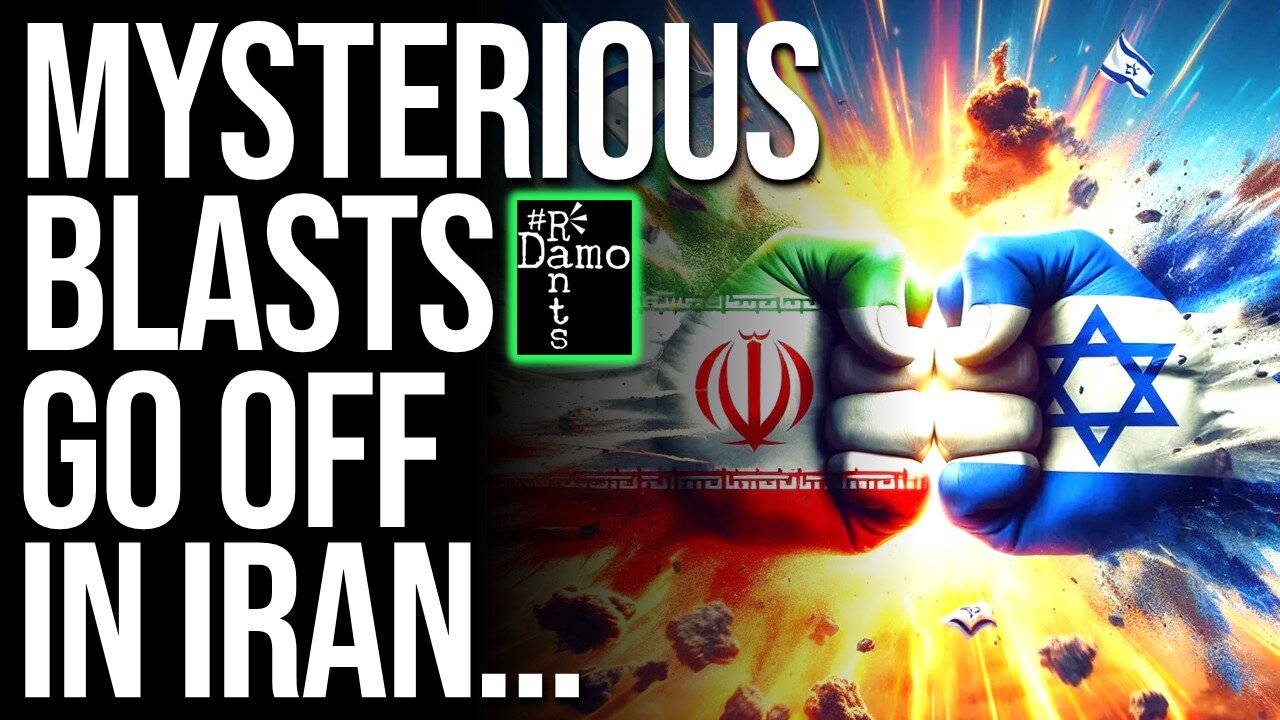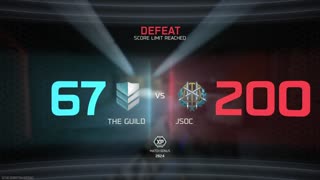Premium Only Content

Iran Knows Who’s Behind the Blasts – And Israel’s Sweating Bullets
Right, so the June 24 ceasefire between Israel and Iran was heralded by Western governments and mainstream media outlets as a crucial breakthrough, a welcome pause after nearly two weeks of heavy bombardments, missile barrages, and cyberattacks and came as something as a surprise given the US had literally just struck three Iranian nuclear research facilities. The truce was framed as a diplomatic success, evidence that both sides had been persuaded to step back from the brink of a catastrophic regional war, even though Iran were not involved with that, they simply agreed to it. Yet for many in Tehran, and other observers of the Israel–Iran conflict, this narrative was never convincing. In the weeks following the ceasefire, not only has Benjamin Netanyahu been to Washington, where he, amongst other things, floated the idea of attacking Iran again, mysterious explosions have been erupting across Iran, striking at oil refineries, factories, and residential complexes. Iranian officials have admitted privately that they have suspected Israeli sabotage. If so, then the ceasefire is again in customary Israeli fashion, being breached here and while not conclusively proven to be Israeli operations at this time, who else is it likely to be?
Right, so mysterious blasts striking civilian infrastructure across Iran – who is behind it? Is it likely to be a covert continuation of Israel’s war against Iran? They are the obvious questions that jump to mind aren’t they? But this time going down a more clandestine route, certainly understandable given the fright Iran gave Israel when they were much more publicly firing on each other last month. They reflect a strategy rooted in plausible deniability and designed to maintain military pressure on Tehran without inviting the devastating missile retaliation Israel suffered during that 12-day conflict. Have hostilities merely shifted from the skies to the shadows, meaning the war never truly stopped?
Well, the truce was always destined to be fragile wasn’t it? Look at Israel’s ceasefire records in Gaza or Lebanon to know that an Israeli ceasefire, all to often it means you cease and they keep firing.
Israel’s June campaign aimed to deliver a decisive blow to Iran’s nuclear ambitions by targeting key sites at Fordow, Natanz, and Isfahan. Yet, according to international nuclear monitors and as I covered the other day, the strikes achieved far less than Netanyahu promised. Fordow sustained significant damage, but Natanz and Isfahan emerged largely intact, with Iranian engineers already repairing centrifuges, potentially everything back up and running within weeks.
Iran’s response was equally significant though. Its missile and drone retaliation was the largest it had ever launched directly at Israeli territory, overwhelming air defences, damaging multiple airbases, and striking deep into urban areas, where Israel likes to build its military Headquarters, civilian infrastructure and therefore civilians essentially becoming human shields for Israel’s military complex. Leaks reported by Haaretz described Israeli military officials as “rattled,” acknowledging privately that the scale of the strikes was unprecedented and forced urgent requests for additional US Patriot and THAAD batteries. Netanyahu, under heavy pressure from Washington, reluctantly accepted the ceasefire on June 24. He’s never been so quick to agree to one before, and wants to start up again now, so you wonder whether this was contingent upon those US bunker buster strikes.
This would explain why the ceasefire, though signed, was never a genuine political agreement. Both sides viewed it as a tactical pause, a chance to regroup and rearm and certainly both sides are acting along those lines. Iran is using the time to repair its nuclear infrastructure, while Israel can repair its defences and arsenal and perhaps consider alternative options to strike Iran, the thought of them not doing so not worth considering since we know Netanyahu wants to go again, he’s said as much to Trump.
The logic for Israel to turn to sabotage is compelling therefore. After the June war, Israel faced two stark realities. First, its failure to cripple Iran’s nuclear program meant that enrichment would resume swiftly, threatening the strategic balance Netanyahu sought to preserve. Second, another round of open conflict carried unacceptable risks – Israel was nowhere near as invulnerable as they thought they were. The June missile barrages had shaken public confidence, damaged Israel’s deterrent image, and exposed weaknesses in its air defence network. Netanyahu cannot afford to appear weak, not when his coalition government teeters on collapse, but neither can he risk provoking Iran into a similar retaliatory response so soon, without shoring up his offenses and defences..
Sabotage offers a solution to both problems. It allows Israel to delay Iran’s nuclear and industrial recovery without openly violating the ceasefire. Mossad has long excelled at such operations. From the Stuxnet cyberattack on Natanz to the assassination of nuclear scientist Mohsen Fakhrizadeh, Israel has repeatedly targeted Iran’s nuclear and military infrastructure through covert means while avoiding direct attribution. The current spate of mysterious explosions bears all the hallmarks of this strategy. Oil refineries, petrochemical plants, and military-linked industrial facilities have been hit—precisely the kinds of targets Mossad has prioritised in the past and despite the Iranian crackdown on Mossad cells in Iran since the conflict last month, there’s no guarantees they got them all.
The Times of Israel’s reporting yesterday, based on New York Times sources, made clear that Iranian officials privately suspected Israeli involvement. The Cradle’s coverage went further, suggesting that Iranian investigators had already found evidence consistent with previous Mossad operations. Officially, Tehran has maintained that many of these incidents were caused by “aging infrastructure” or “substandard equipment.” Yet even state media has begun hinting at foreign involvement, and the sheer number of incidents occurring in strategically vital locations undermines the credibility of the technical-failure narrative.
If Israel’s strategy is designed to pressure Iran into halting its nuclear program, it appears to be having the opposite effect though. Iranian leaders have responded not with concessions, but with open defiance. President Masoud Pezeshkian, speaking to Al Jazeera yesterday as well, declared that Iran would not suspend its nuclear enrichment, regardless of Israeli pressure or the threat of renewed strikes. Pezeshkian’s statement was more than rhetorical bravado; it reflected a broader Iranian strategy of demonstrating resilience to domestic and international audiences, they won’t back down from this.
These comments come at a time that reinforces Ayatollah Ali Khamenei’s position in speeches reported by Reuters on July 16. He warned that Iran was prepared to deliver “bigger blows” if Israel resumed its attacks, framing Iran’s missile arsenal as a credible deterrent. IRGC commanders echoed this, with Major-General Mohammad Pakpour and Chief of Staff Mohammad Bagheri describing Iran’s forces as being at “peak operational readiness.”
This readiness has been evident in Iran’s actions. Missile brigades have reportedly been repositioned to enable strikes deep inside Israel, while Financial Times satellite analysis confirmed the redeployment of Bavar-373 and Khordad-15 air defence systems around nuclear and military sites. Iran’s naval forces, too, have been assertive. Another example of this combat readiness has been news that an Iranian IRGC helicopter confronted the USS Fitzgerald in the Gulf of Oman, forcing the US destroyer to alter its course. The incident served as a pointed reminder that Iran is not demobilising and remains prepared to defend its interests against both Israeli and US threats.
IRGC officials have been blunt in their interpretation of the situation. As Press TV reported, commanders now describe the current truce as merely a “suspension of hostilities.” This assessment is hard to dispute when Iran is simultaneously repairing nuclear infrastructure, rearming, and warning publicly of retaliatory strikes, all whilst mysterious blasts are going off.
If Israel is indeed behind these explosions, then it has already violated the ceasefire in every meaningful sense. The US-brokered agreement of June 24 required a cessation of “all offensive military actions” by both parties. International law does not differentiate between overt airstrikes and covert sabotage. Acts of sabotage that destroy infrastructure and risk civilian casualties are acts of war.
Israel’s defence lies in plausible deniability here therefore, not legality. As long as Iran cannot produce irrefutable proof, Israel can claim adherence to the ceasefire while continuing its alleged campaign in secret. This strategy leaves Iran in a difficult position. Retaliating without public evidence would allow Israel and its Western allies to paint Tehran as the aggressor, undermining Iran’s diplomatic position. But Iran’s leaders clearly view the truce as already broken in spirit. Every public statement from Pezeshkian, Khamenei, and IRGC commanders suggests that Tehran considers itself still at war, merely waiting for the inevitable moment where they have to respond.
The central question now is how long this illusion can last. Iran has thus far exercised restraint, likely to complete repairs on its nuclear facilities and avoid being portrayed internationally as the side that reignited the war. But its patience is unlikely to last indefinitely. Each new explosion increases the pressure on Tehran to retaliate. If Israel continues these operations, it risks provoking the very escalation it sought to avoid.
There are also risks for Israel beyond the battlefield. Covert sabotage may rally Iranian domestic support behind the regime, strengthening rather than weakening Tehran’s resolve. And if Iran can gather and present convincing evidence of Israeli involvement, it could use this to justify a legally defensible military response under Article 51 of the UN Charter. Such a move would almost certainly trigger another cycle of open hostilities, though with Iran having shown much more restraint than Israel, a more likely response I think, would be for them to present their findings to the UN without necessarily backing it up with force again – an overt response to covert actions, would no doubt be spun by pro Israeli media as Iranian instigation after all.
While publicly celebrating the ceasefire, the US benefits from Israel’s shadow war, which weakens Iran without risking direct American casualties. Yet if sabotage escalates into full-scale conflict again, the US will not only have asked for it by not reining Israel in, but could be dragged in more overtly themselves.
The June 24 ceasefire between Israel and Iran likely does more in diplomatic rhetoric than in reality. Mysterious explosions across Iran don’t just happen all by themselves, coupled with Israeli leaders’ open threats and Iran’s combat readiness, reveal that the war has simply shifted forms at this point in time. This is a conflict that appears to now be being fought in the shadows, not paused. The strategic logic of Israeli sabotage, the timing of the attacks, and their alignment with Mossad’s historical methods all point toward Israel’s responsibility. If confirmed, these acts are not just provocations; they are a breach of the truce’s terms and a violation of international law.
Iran, for its part, has made clear that it does not believe in the ceasefire. Pezeshkian’s defiant statements, Khamenei’s warnings, and the IRGC’s readiness all signal a nation preparing for the next round, but nobody who observed the 12 day conflict last month, believes Iran will trigger it.
Of course one thing Israel will need lots of to carry on and that they increasingly don’t have much of, is money and Benjamin Netanyahu appears to be setting Israel’s economy on fire to finance ongoing atrocities. Netanyahu chose genocide over growth and the bill just arrived. Get all the details of that story in this video recommendation here as your suggested next watch.
Please do also hit like, share and subscribe if you haven’t done so already so as to ensure you don’t miss out on all new daily content as well as spreading the word and helping to support the channel at the same time which is very much appreciated, holding power to account for ordinary working class people and I will hopefully catch you on the next vid. Cheers folks.
-
 LIVE
LIVE
Dr Disrespect
4 hours ago🔴LIVE - DR DISRESPECT - BABY STEPS - THE VERY VERY LAST CHAPTER
2,476 watching -
 LIVE
LIVE
StoneMountain64
3 hours agoBLACK OPS 7 Unlocking Weapons and Overclocks (Mouse and Keyboard Player)
171 watching -
 LIVE
LIVE
ahdedazs
2 hours ago $0.03 earnedBlack Ops 7 EARLY ACCESS BETA! Second Stream on RUMBLE! *NEW CREATOR*
55 watching -
 LIVE
LIVE
LadyDesireeMusic
2 hours ago $0.47 earnedLive Piano 10-3-25
208 watching -
 54:08
54:08
vivafrei
1 hour agoLive With Dinesh D'Souza-The Dragons Prophecy
38.1K12 -
 3:20:13
3:20:13
Barry Cunningham
4 hours agoBREAKING NEWS: KAROLINE LEAVITT HOSTS SURPRISE WHITE HOUSE PRESS CONFERENCE!
46.5K26 -
 12:15
12:15
Dr. Nick Zyrowski
4 days agoSTOP Believing These Fasting Lies That Keep You Sick
7.3K1 -
 2:01:12
2:01:12
The Culture War with Tim Pool
5 hours agoNigeria's Christian Genocide, Media Ignoring Atrocities | The Culture War Podcast
154K82 -
 1:18:30
1:18:30
The Shannon Joy Show
2 hours agoKash Patel Doubles Down On Speech Control Opens The Door For Mass Censorship in America (Sponsored)
19.1K4 -
 2:08:19
2:08:19
Side Scrollers Podcast
6 hours agoNetflix Execs to TESTIFY Over LGBTQ Agenda + IGN DESTROYS Xbox Game Pass + More | Side Scrollers
36.8K6
